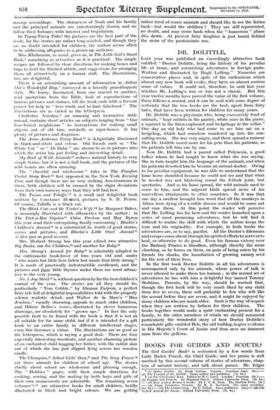DR. DOLITTLE.
LAST year was published an exceedingly attractive book entitled " Doctor Dolittle, being the history of his peculiar life at home, and astonishing adventures in foreign parts. Written and illustrated by Hugh Lofting." Nurseries are conservative places and, in spite of the enthusiasm which almost any new book will evoke, they have an almost austere sense of values. It could not, therefore, be said last year whether Mr. Lofting's was or was not a classic. But this year twelve months have proved the value of the first volume, there follows a second, and it can be said with some degree of certainty that the two books are the best, apart from fairy tales, that have been written for children for many years.
Dr. Dolittle was a physicain who, being excessively fond of animals, " kept rabbits in the pantry, white mice in the piano, a squirrel in the linen-cupboard and hedgehogs in the cellar." One day an old lady who had come to see him sat on a hedgehog, which had somehow wandered up into the con- sulting room. She was very angry, and there spread a rumour that Dr. Dolittle cared more for his pets than his patients, so his patients left him one by one.
Now Dr. Dolittle had a parrot called Polynesia, a good talker whom he had taught to know what she was saying. She in turn taught him the language of the animals, and when his patients deserted him he became an animal-doctor. Owing to his peculiar equipment, he was able to understand that the lame horse stumbled because he could not see and that what he needed was not blistering round the fetlock joint, but spectacles. - And so his fame spread, the wild animals used to come to him, and the migrant birds spread news of his marvellous attainments to other countries. So it was that one day a swallow brought him word that all the monkeys in Africa were dying of a terrible disease and would he come out and cure them. At this point the reader will perceive that Mr. Lofting has his hero and the reader launched upon a series of most promising adventures, but he will find it difficult to realize the skill with which the author keeps the tone and his originality. For example, in both books the adventures are, so to say, pacifist. All the Doctor's dilemmas and escapes come about through his spirited efforts to serve or to heal, or otherwise to do good. Even his famous victory over the Barbary Pirates is bloodless, although thereby the more clinching, as he forces on them, on pain of being eaten by his friends the sharks, the humiliation of growing canary seed for the rest -of their lives.
In the first book Doctor Dolittle in all his adventures is accompanied only by his animals, whose power of talk is never allowed to make them too human ; in the second set of adventures he has with him a delightful boy named Tommy Stubbins. Parents, by the way, should be warned that, though the first book will be very much liked by any child from five to seven, there will probably be few who will like the second before they are seven, and it might be enjoyed by many children who are much older. Such is the way of sequels when they are written by fathers for their children. The books together would make a quite enchanting present for a family, to the older members of which we should commend particularly the wonderful story of how Doctor Dolittle's remarkable gifts enabled Bob, the old bulldog, to give evidence in His Majesty's Court of Assize and thus save an innocent man from the gallows.


















































 Previous page
Previous page